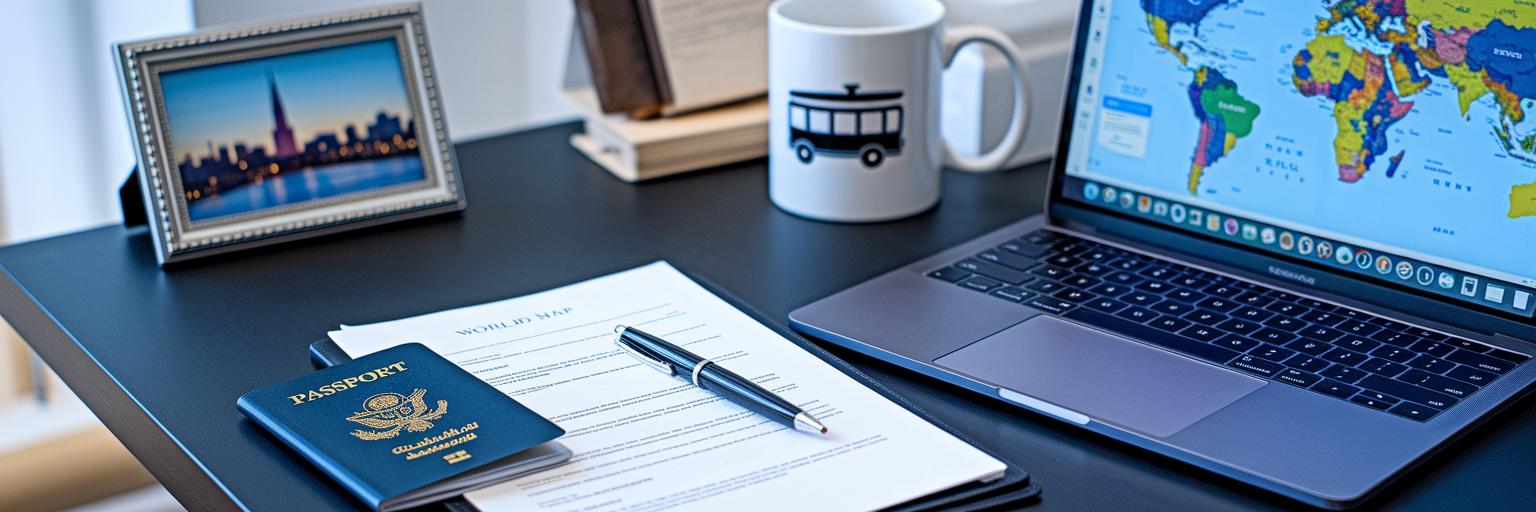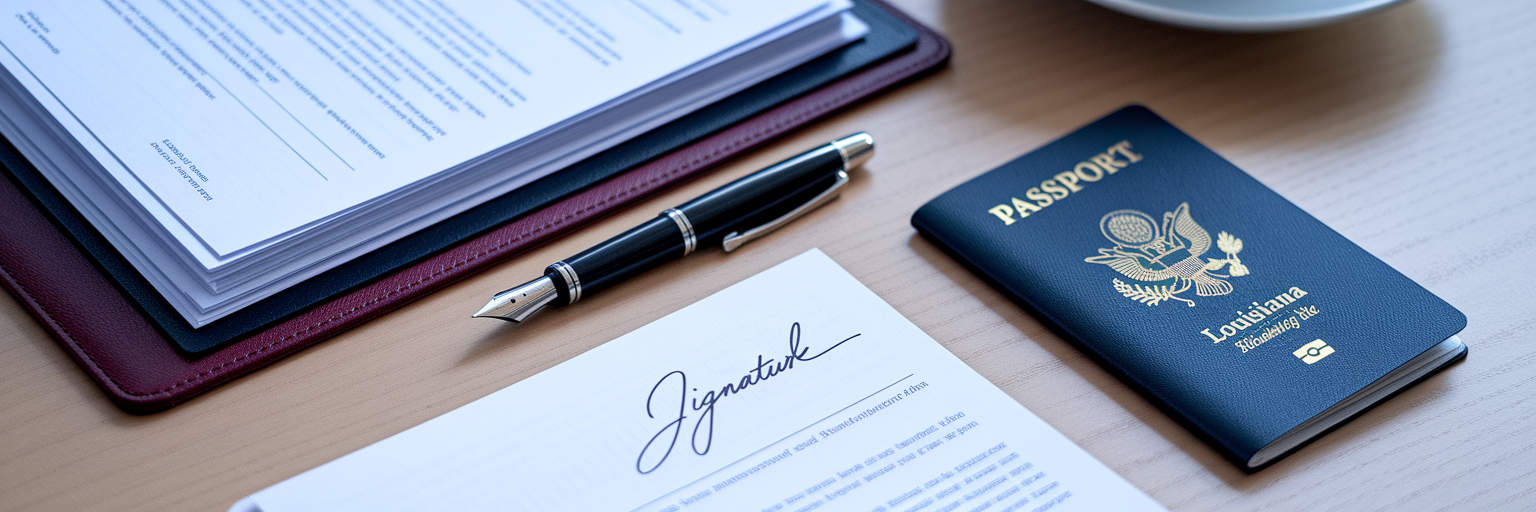A Louisiana Student's Notary Guide for Studying Abroad

Preparing to study abroad is an exciting time filled with anticipation. While you are busy packing and planning your adventures, there is a critical step that often gets overlooked: preparing your legal documents. This guide will walk you through the essential notarization and authentication processes to ensure your paperwork is accepted without a hitch, wherever your studies take you.
Why Your Paperwork Needs Official Validation for International Use
The Hague Apostille Convention includes over 120 member countries, creating a simplified path for authenticating documents. However, this simplification does not eliminate the need for proper validation. A signature that works for a local lease in New Orleans will not automatically be accepted by a university registrar in Spain or a landlord in Italy. Foreign institutions operate under different legal systems and require a higher level of assurance that your documents are authentic and legally binding.
This is where notarization comes in. Think of it as an official anti-fraud measure for your most important paperwork. A Notary Public acts as an impartial, state-commissioned witness who verifies your identity, confirms you are signing willingly, and records the act. This process transforms a simple document into a legally credible instrument.
For any student preparing their study abroad documents Louisiana, notarization is the foundational step. It is the first, non-negotiable action that makes your Louisiana-issued documents credible on a global stage. Without it, further steps like obtaining an apostille are impossible, potentially delaying or even jeopardizing your international plans.
Key Documents You Will Likely Need Notarized

Navigating the required paperwork can feel overwhelming, but understanding each document’s purpose makes the process much clearer. Here are the key forms you will likely need to have notarized before you leave Louisiana.
Limited Power of Attorney (PoA)
A power of attorney for college student is one of the most practical documents you can prepare. It allows you to designate a trusted person, typically a parent, to manage specific financial or administrative tasks on your behalf while you are overseas. This could include accessing your New Orleans bank account in an emergency, signing tax forms, or handling unexpected university paperwork back home. It provides a crucial safety net, ensuring your affairs in Louisiana can be managed without your physical presence.
Medical Consent Forms and Health Waivers
In a medical emergency, the last thing you or your family want are legal delays. A notarized medical consent form authorizes healthcare providers to treat you without waiting for parental consent, which can be complicated to obtain across time zones. It is a simple document that provides immense peace of mind, ensuring you can receive prompt medical attention when you need it most.
Study Abroad Agreements and Enrollment Forms
Your host university will likely require you to sign enrollment agreements or program contracts. Notarizing your signature on these documents formalizes your commitment and confirms you understand the terms, from academic expectations to payment schedules. It adds a layer of official verification that foreign institutions often require for their records.
International Housing Contracts
If you have secured off-campus housing, your landlord may require your lease agreement to be notarized. This protects both you and the landlord by creating a legally recognized contract. It ensures your housing is secured and that all parties have agreed to the same terms, preventing potential disputes down the road.
| Document Type | Primary Purpose | Who It Protects or Empowers |
|---|---|---|
| Limited Power of Attorney | Allows a trusted person to manage specific financial/legal affairs back home. | The student (by ensuring their affairs are managed) and their designated agent (parent/guardian). |
| Medical Consent Form | Authorizes medical treatment in an emergency without legal delays. | The student (by enabling swift medical care) and healthcare providers. |
| Study Abroad Agreement | Formalizes enrollment and commitment to the program's rules and fees. | The foreign university (ensuring student commitment) and the student (clarifying terms). |
| International Housing Contract | Secures a legally binding rental agreement for accommodation. | The student (by securing housing) and the landlord (ensuring lease terms are met). |
The Notary's Role in Your Study Abroad Preparations
Once you have gathered your documents, the next step is finding a qualified notary. The notary’s role is more than just stamping a piece of paper. They perform several key functions: meticulously verifying your identity with a government-issued ID like a Louisiana driver's license, witnessing your signature to confirm it was made willingly, and applying their official seal and signature to the document.
This is why competence matters. An experienced notary, especially one with a legal background, can spot potential issues with documents intended for international use. They understand the specific wording and formats that foreign authorities expect, which helps prevent costly rejections and delays. At JP Notary, our experience ensures that your documents are handled with the precision required for international validation.
We also understand that as a student, your schedule is packed. Finding time to visit an office can be a challenge. That is why convenient notary services New Orleans are so valuable. mobile notary services bring the appointment to you, whether at your home, a coffee shop, or on campus. This small investment in professional notarization provides critical peace of mind, ensuring the entire international validation process starts on a solid foundation. A trusted professional often provides resources to help clients prepare, such as the articles available on our blog.
From Notarization to Global Recognition: The Apostille Process

After your documents are notarized, there is often one more crucial step: obtaining an apostille. An apostille is not another notarization. It is a separate, state-level certificate that authenticates the notary’s commission. Essentially, the State of Louisiana is certifying that the notary who signed your document is legitimate and in good standing. This is the standard requirement for all countries that are part of the Hague Convention.
So, how to get an apostille in Louisiana? The process is straightforward if you follow the steps correctly:
- Ensure Correct Notarization: The document must be properly notarized first. Any error here will cause the entire submission to be rejected.
- Complete the Official Request Form: You must fill out the apostille request form provided by the Louisiana Secretary of State.
- Submit Your Documents: Send the original notarized document, the completed request form, and the required fee to the Secretary of State’s office in Baton Rouge.
According to the Louisiana Secretary of State, documents sent to another country first require verification of the notary's signature. You can find the official forms and most current fee schedule on their website. Be sure to plan ahead, as processing can take time. If your destination country is not part of the Hague Convention, you may need a more complex process called legalization, so always verify the specific requirements for your host country.
Your Actionable Checklist for Flawless Document Preparation
With a clear understanding of the process, you can confidently prepare your documents. Follow this checklist to ensure nothing is missed.
- Confirm All Requirements: Contact your study abroad program and the destination country's consulate to get a definitive list of all required documents and their specific authentication needs.
- Gather and Review Your Documents: Collect all necessary forms. Carefully check them for accuracy, ensuring names and personal information match your passport exactly.
- Schedule Your Notary Appointment: Do not wait until the last minute. For students in the Greater New Orleans area, you can book a convenient office or mobile appointment with an experienced professional at JP Notary by calling 504-513-7333 or visiting our website to ensure your Louisiana notary for international documents are executed correctly.
- Prepare Your Apostille Submission: Immediately after your documents are notarized, prepare the package for the Louisiana Secretary of State.
- Digitize and Back Up Everything: Scan and save digital copies of all your fully executed and apostilled documents. Keep them accessible in a secure cloud storage account.
Common Mistakes to Avoid Before You Depart
A small oversight can create a big headache. To ensure a smooth process, be mindful of these common pitfalls.
- Procrastination: The combined notarization and apostille process can take several weeks. Starting early is the single best way to avoid stress and potential delays to your travel plans.
- Incorrect Notarization: A document with a missing seal, an incorrect date, or improper notarial wording will be rejected by the Secretary of State. This forces you to start the entire process over, wasting valuable time and money.
- Forgetting the Apostille: For most international destinations, a notarized document alone is not enough. It will be considered invalid without the apostille. Always confirm if your destination country requires it.
By preparing your documents correctly, you can focus on what truly matters: an incredible educational and cultural experience abroad. If you need assistance with Spanish language documents for your travels, you can find more information on our services for the Spanish-speaking community. Read what our clients say about our 5-star notary services.
Need Professional Notary Services?
Contact JP Notary for reliable, professional notary services in New Orleans.
